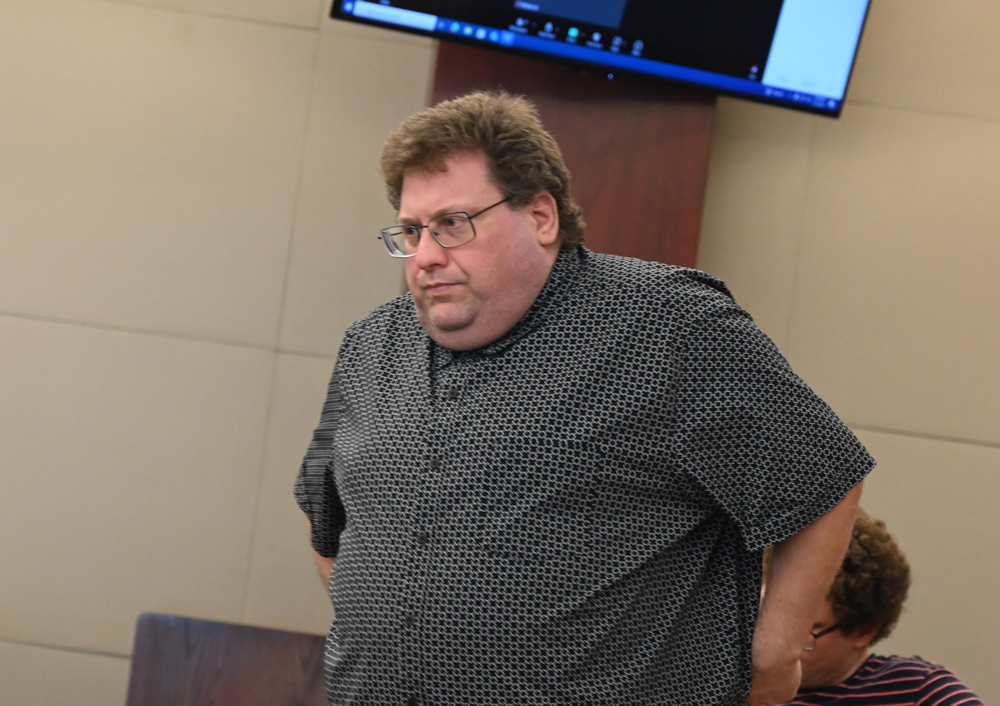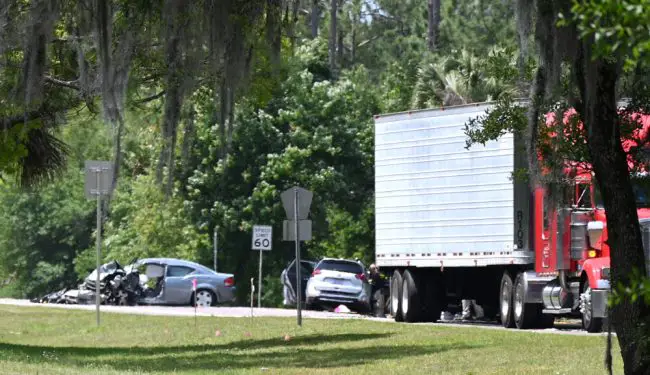
John Garrison was facing a minimum-mandatory nine-year sentence if he was found guilty of causing the crash that ended the life of 59-year-old Debra Ashrafi in a head-on collision on State Road 11 in Bunnell on April 24, 2022.
In a significant reduction of the potential sentence, Garrison on Monday pleaded to the three charges against him in exchange for a maximum sentence of three years in prison and 10 years on probation when Circuit Judge Dawn Nichols sentences him on Dec. 5. The plea terms include a permanent revocation of Garrison’s driver’s license and driving privileges.
Garrison, who will be 50 on Nov. 25, is an electrician who had depended on his car for work–and was on his way to south Florida for work at the time of the crash. He pleaded guilty to vehicular homicide and two counts of reckless driving causing serious bodily injury. The two other victims in the crash, both of whom were severely injured (as was Garrison), were Shana Sciortino, who was driving the oncoming vehicle, and her 79-year-old mother Shirley Burkett.
Garrison will have to serve 100 hours of community service either at trauma centers, such as at Halifax hospital in Daytona Beach, or make presentations to minors on the dangers of reckless driving. He is also expected to make restitution to the surviving victims. The amount has not been set. He was represented by attorney Brian Smith. The case was prosecuted by Assistant State Attorney Melissa Clark, who was in touch with the victims’ families prior to the plea.
“I’ve spoken with the next book kin at length about this,” Clark said, explaining to the judge the so-called “downward departure” from the minimum mandatory sentence. “They’re in agreement with it. One of their primary concerns was a permit DL revocation. So that’s why we came down in the incarceration portion to ensure that that would be part of the sentence.”
Separately, Garrison faces four civil suit, including from both the surviving victims and from Ashrafi’s spouse, as well as from an insurance company. The trial date in the case filed by the deceased victim’s spouse is set for June 23 before Circuit Judge Chris France in Flagler County Circuit Court. Garrison’s employer at the time of the crash, Apogee Integrations, is also a defendant in the case. The company has been named in other related cases. It filed motions for summary judgment in two of them and was denied both, and is expected to be denied a third following a hearing on Thursday.
Garrison remains out on $30,000 bond until his Dec. 5 sentencing at 1:30 p.m.
The previous story is below.
![]()
John Garrison Charged With Vehicular Homicide, Faces Minimum of 9 Years in Prison in Death of Debra Ashrafi on SR11
December 12, 2023–John Frederick Garrison, a 49-year-old resident of Deltona, was arrested Monday on charges of vehicular homicide and reckless driving causing serious injuries as a result of the head-on crash last year on State Road 11 south of Bunnell that devastated three generations of a single family.
The crash took the life of Debra Ashrafi, 59, and critically injured her 41-year-old daughter Shana Sciortino, who was at the wheel of the vehicle, and her 79-year-old mother Shirley Burkett. Sciortino, Burkett, and Ashrafi’s husband Dariush all have filed civil suits against Garrison. His car insurer at the time has filed suit to defend against any claims, arguing that Garrison was on a work trip at the time and so was not covered by the policy.
Garrison, an electrician and electronics installer, faces a minimum mandatory nine years in prison if convicted on the vehicular homicide charge, which is applied when a person is killed as a result of reckless driving. The Florida Highway Patrol determined Garrison had been driving recklessly. His combined charges add up to a potential maximum of 25 years in prison if he is convicted. Garrison is being held at the Volusia Branch Jail, pending extradition to Flagler County. He’s being held on $30,000 bond.
The crash took place on April 24, 2022, at 10:50 a.m. just south of Bunnell. (See: “59-Year-Old Woman Killed, Two Critical in Head-On Crash on SR 11 Just Past Center of Bunnell.”) Depositions, statements and affidavits in the several civil cases provide an unusually detailed breakdown of what led to the crash, and to a misjudgment that ended a life and permanently changed the trajectory of four others.
That morning, Garrison and his son, now 22, had set off from Eustis with Eric Vonhold, in two cars, on their way to a pair of jobs for the same company Apogee Integrations–the Garrisons in Connecticut, Vonhold in New Jersey. The Garrisons installed electronic equipment in highway patrol vehicles. They would travel together for much of the way, the Garrisons in their 2008 Dodge Avenger, Vonhold in his Mazda. Their GPS had them take SR11, on their way to I-95. Garrison had never been on 11 before.
Garrison and Vonhold were on the phone. Garrison’s phone was in a cup holder. Vonhold as lead driver would give directions, “he would basically like reiterate and tell us, you know, change lanes, go to the left for passing or there’s an off ramp coming up that we need, that kind of stuff. So we just followed him along,” Garrison said.
Apparently unbeknownst to Vonhold, Garrison–a friend of more than 20 years’ date–relied on him for directions. “We swapped position while driving the trip. There’s no lead or subordinate or anything of that nature,” Vonhold recalled. “If he was relying on me, he didn’t tell me that he had–that he needed to follow me.” It was the first time they’d gone on a trip together, in separate cars. “It’s not like it would be the end of the world if we got separated. We both have the same locations, same apps, the same directions.”
They’d been following a semi truck that was going 8 to 10 miles per hour under the speed limit, for some 10 miles. “I finally found a long patch that was completely clear, and so I took the chance to go ahead and pass,” Vonhold said. “And it weas clear. I was able to pass them.” He doesn’t remember whether Garrison was behind him during the passing maneuver, only that the truck started accelerating once he tried to pass. He got past him without a problem. He also saw another vehicle approaching in the other direction.

That was Ashrafi’s vehicle. Vonhold said he would not have started passing had he seen the car first. He heard Garrison say he was going to pass, too. “Now I remember that. He said I’m gonna pass, and I think at that time that’s when I said that was too close,” Vonhold said, “and I was hoping maybe he wouldn’t try to pass.”
Garrison did. He remembers the sequence. “We were passing traffic and there was a semi on the right,” Garrison said. Garrison said he didn’t know what the hurry was. “Not like we had to get anywhere. We were going to frigging Virginia and staying a night at a hotel, so whenever we got there we got there.” But he decided to pass all the same. As they were passing the cars, he said his eyes were trained on Vonhold’s taillights. “I felt more like a passenger than being situationally aware of what I was doing,” he said.
“It was a two-lane road. There was a deep valleyed ditch on the left. He [Vonhold] sped up to the right even more and got in front of a semi and when he did I noticed the traffic that I could see over the roof of his car was much closer than what looked like the semi that was further back. I remember standing on the brakes, the car almost not quite fishtailing and trying to recorrect for that.”
It was a catastrophic misjudgment. Garrison hadn’t been drinking. He hadn’t been smoking pot. He wasn’t on prescription drugs. He’d made a decision to pass, and it was the wrong decision.
“I remember the airbags, that white thing coming at my face at some point,” he said. “I remember saying something to [my son] like, gosh, that was close, or God saved us, that was close. And then I remember an impact, and then that’s about the last thing that I remember. I was out for a little bit.”
Vonhold didn’t see, but he heard, the impact, describing it “like a thunderous bump.” The phone line was still open. He doesn’t remember saying anything on the phone. He turned around, parked, went into what was a “hectic” scene, and went over to Garrison’s son, but not to John Garrison. He did not check on any of the victims in either cars involved in the crash. He said he was in shock. “I didn’t go inspecting vehicles or climbing into vehicles or doing anything like that there because I didn’t want to get into anything and be in the way,” he said. He walked by Garrison’s vehicle but didn’t get close.
“I think I overheard somebody talking about how it looks like someone may not have made it,” Vonhold said.
Garrison was knocked out and remembers only vaguely, in glimpses, how someone knocked on his car door, how he seemed to have been transported, how he was in an X-Ray room. His right foot, left shoulder, his right wrist and three ribs were broken. His son fared much better, though he refuses to have any conversations about the crash. The family in the other car fared far worse.
Garrison in depositions or statements has taken responsibility, refusing to blame either Vonhold or the trucker, let alone anyone in the other car, since the other car had the right of way, he said. “I was the one driving. I just trusted someone else’s opinion of what we were doing and went along with it,” Garrison said. He’d committed. Then “There was nowhere to go.”
At the end of one of his interviews with an attorney representing Debra Ashrafi’s estate, the attorney asked him: “Is there anything else you’d like to add, Mr. Garrison?” Ashrafi had been a business owner in New Jersey.
“That I am so incredibly sorry for all of this–my heart breaks–literally I’m dying inside,” Garrison replied. “I’m so sorry.” He then sobbed uncontrollably.
“I know you are, and I appreciate your saying that,” the attorney said. “It’s a horrible thing, but you know accidents do happen and it’s unfortunate–I think you know in time everything will be okay, hopefully.”
The criminal and civil cases stacked up against Garrison tell a different story.






























Jay Tomm says
Passing cars like that need to be outlawed. Many times on 11 & 100 extension I have had to avoid the morons passing.
I like the way it’s set up on 40 going to Ocala. Dedicated wide passing lanes in some spots.